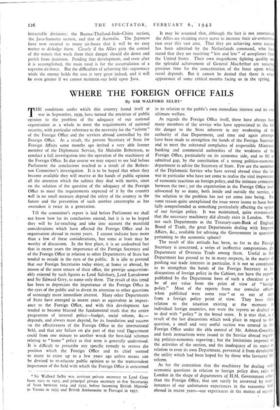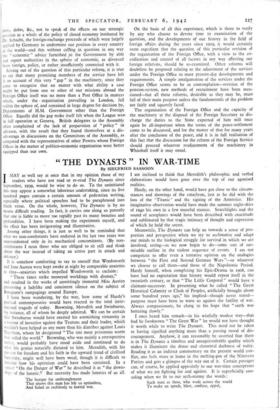WHERE THE FOREIGN OFFICE FAILS
By SIR WALFORD SELBY*
THE conditions under which this country found itself at war in September, 1939, have turned the attention of public opinion to the problem of the adequacy of our national organisation as a whole to meet the requirements of national security, with particular reference to the necessity for the "reform" of the Foreign Office and the services abroad controlled by the Foreign Office. As a result, the present Secretary of State for Foreign Affairs some months ago invited a very able former member of the Diplomatic Service, Sir Malcolm Robertson, to conduct a full investigation into the operation of the machinery of the Foreign Office. In due course we may expect to see laid before Parliament the conclusions reached as a result of the Robert- son Committee's investigation. It is to be hoped that when they become available they will receive at the hands of public opinion all the attention which the subject they deal with merits, since on the solution of the question of the adequacy of the Foreign Office to meet the requirements expected of it by the country will in no small measure depend the safety of the country in the future and the prevention of such another catastrophe as has overtaken it twice in a generation.
Till the committee's report is laid before Parliament we shall not know how far its conclusions extend, but it is to be hoped they will be far-reaching and take into account the manifold considerations which have affected the Foreign Office and its organisation abroad in recent years. I cannot indicate here more than a few of these considerations, but some at least may be worthy of discussion. In the first place, it is an undoubted fact that in recent years the importance of the Foreign Secretary and of the Foreign Office in relation to other Departments of State has tended to recede in the eyes of- the public. It is idle to pretend that our Foreign Secretaries today enjoy, at home or abroad, by reason of the mere tenure of their office, the prestige unquestion- ably enjoyed by such figures as Lord Salisbury, Lord Lansdowne and Sir Edward Grey, to name only three. The result of this trend has been to depreciate the importance of the Foreign Office in the eyes of the public and to divert its attention to other questions of seemingly more immediate interest. Many other Departments of State have emerged in recent years as equivalent in import- ance to the Foreign Office, and with this development has tended to become blurred the fundamental truth that the entire programme of internal policy—budget, social reform, &c.— depends, and always must depend, for its foundation and success on the effectiveness of the Foreign Office in the international field, and that any failure -on the part of that vital Department could from one minute to another wreck the best-laid schemes relating to " home " policy as that term is generally understood. It is difficult to prescribe any specific remedy to restore the position which the Foreign Office and its chief seemed to many to enjoy up to a few years ago unless means can be devised to re-educate public opinion as to. the transcendent importance of the field with which the Foreign Office is concerned
* Sir Walford Selby was assistant private secretary to Lord Grey from 1911 to 1915, and principal private secretary to five Secretaries of State between 1924 and 1932, before becoming British Minister to Vienna in 1933 and British Ambassador to Portugal in 1937.
in its relation to the public's own immediate interest and its own ultimate welfare.
As regards the Foreign Office itself, there have always been many members of the service who have appreciated to the full the danger to the State inherent in any weakening of the authority of that Department, and time and again attempts have been made to strengthen the hands of the Foreign Secretary and to meet the reiterated complaints of responsible Ministers, .banking and commercial authorities of the weakness of the Foreign Office, particularly on its economic side, and to fill an admitted gap, by the constitution of a strong politico-economic department to advise the Secretary of State. Few are the members of the Diplomatic Service who have served, abroad since the last war in particular who have not come to realise the vital importance of economic reactions on foreign policy, and the intimate connexion between the two ;. yet the organisation in the Foreign Office itself advocated by so many, both inside and outside the service, as the solution to the problem has not yet come into being. Fee some reason quite unexplained the issue never 'seems to have been fully comprehended as something particularly affecting the sphere of our foreign policy. It was maintained, quite erroneously, that the necessary machinery did already exist in London. Were not such Departments as the Treasury-cum-Bank of England. Board of Trade, the great Departments dealing with Imperial Affairs, &c., available for advising the Government in questions pertaining to the economic sphere?
The result of this attitude has been, so far as the Foreign Secretary is concerned, a series of ineffective compromises, the Department of Overseas Trade among them. Useful as that Department has proved to be in many respects, in the matter of pushing our trade interests in particular, it is not so constituted as to strengthen the hands of the Foreign Secretary in his discussions of foreign policy in the Cabinet, nor have the reports published by the Department been of such a charatter as to be of any value from the point of view of " foreign policy." Most of the reports from our consular officers when published were some year' or so out of date from a foreign policy point of view. They bore little relation to the situation existing at the moment in individual foreign countries, nor were the 'reports so drafted as to deal with " policy " in the broad sense. It is true that, as a result of the last discussions which took place in regard to this question, a small and very useful section was created in the Foreign Office under the able control of Mr. Ashton-Gwatkin. and fresh instructions were issued to the Service abroad regard- ing politico-economic reporting ; but the limitations imposed 011 the activities of the section, and the inadequacy of its status in relation to even its own Department, prevented it from developing the utility which had been hoped for by those who favoured the reform.
As for the contention that the machinery for dealing with economic questions in relation to foreign policy does. exist in London in the shape of departments of H.M. Government other than the Foreign Office, that can surely be answered by man}' instances of our unfortunate experiences in the economic field abroad in recent years—our experiences in the matter,- of Mall.
tions, debts, &c., not to speak of the effects on our strategic position as a whole of the policy of closed economy instituted by Dr. Schacht, the foreign-exchange proceeds of which were largely applied by Germany to undermine our position in every country M the world—and this_ without calling in question in. any way the " economic " advice furnished to the Government by able and expert authorities in the. sphere of economic, as divorced from foreign, policy, or rather insufficiently connected with it.
Arising out of the question of this particular reform, it is true to say that many promising members of the service have left it on account of this very " gap " in the machinery, since they came to recognise that no matter with what ability a case might be put from one or other of our missions abroad the Foreign Office itself was no more than a Post Office in matters which, under the - organisation prevailing in London, fell within the sphere of, and remained in large degree for decision by, Departments of H.M. Government other than the Foreign Office. Equally did the gap make itself felt when the League was. in full operation at Geneva. British delegates to the Assembly often complained of the lack of preparation of " policy " in advance, with the result that they found themselves at a dis- advantage in discussions on the Committees of the Assembly, as compared with the representatives of other Powers whose Foreign Offices in the matter of politico-economic organisation were better equipped than our own. On the basis of all this experience, which is there to verify by any who choose to devote time to examination of the question, and the developments of our history in the field of foreign affairs during the years since 1919, it would certainly seem expedient that the question of this particular revision of the organisation of the Foreign Office, with a view to the co- ordination and control of all factors in any way affecting our foreign relations, should be re-examined. Other reforms will doubtless be proposed relating to the adjustment of the services under the Foreign Office to meet present-day developments and requirements. A simple amalgamation of the services under the Foreign Office seems to be in contemplation—revision of the pension-system, new methods of recruitment have been men- .tioned—but all these reforms, desirable as they may be, must fail of their main purpose unless the fundamentals of the problem are fairly and squarely faced.
The organisation of the Foreign Office and the capacity of the machinery at the disposal of the Foreign Secretary to dis- charge the duties to the State expected of him will once again be all-important when the terms of the peace-settlement come to be discussed, and for the matter of that for many years after the conclusion of the peace, arid it is in full realisation of this fact that the discussion for the reform of the Foreign Service should proceed whatever readjustment of the machinery in Whitehall itself it may entail.



























 Previous page
Previous page